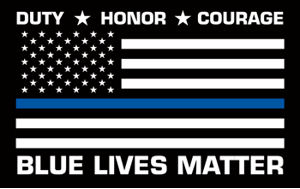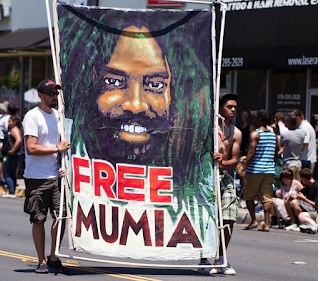40 year’s later, Slain Officer-Hero Daniel Faulkner’s wife is still dealing with this outrageous case.
By Ralph Cipriano – for Bigtrial.net
Lawyers for the widow of slain Police Officer Danny Faulkner filed a petition in court today seeking to disqualify District Attorney Larry Krasner from serving as prosecutor in the most recent appeal filed on behalf of Mumia Abu-Jamal, Faulkner’s convicted killer.
On Dec. 23rd, 40 years after Faulkner was murdered, lawyers for Abu-Jamal filed the latest appeal in the long-running case, seeking for the sixth time to get Abu-Jamal out of jail.
The basis for the most recent appeal was alleged new evidence supposedly discovered by Krasner himself in December 2018 in a storage room, while he was wandering around the D.A.’s office.
However, a subsequent court battle over that alleged newly discovered evidence, six boxes of files that were stored in the D.A.’s office for decades, revealed that there was nothing new there.
Instead, the bottom line of the prior litigation was that Krasner, our criminal-loving D.A., had gone off half-cocked in his desire to get Mumia the celebrity cop killer out of jail.
In an email today to supporters of Faulkner’s widow, Maureen, George Bochetto, the lawyer who’s representing her, said that the latest Mumia appeal is “replete with lies, fabricated accusations of prosecutorial misconduct, and worn-out allegations of racism.”
“The problem is, Philadelphia D A. Larry Krasner wants to spring Abu-Jamal from jail — and to claim such freedom as his crown-jewel of ‘criminal justice reform,’ ” Bochetto wrote.
In previous litigation, Bochetto sought to disqualify Krasner from participating in any appeals in the Faulkner case. Why?
Because Krasner, a criminal defense lawyer for 30 years, had several conflicts of interest, including his previous representation of R2K, a legal collective organized by the National Lawyers Guild. That’s a left-wing outfit that had long advocated freeing Abu-Jamal, the poster boy in the crusade to end mass incarceration.
In addition to that conflict, two Krasner staffers in the D.A.’s office, as well as a close political advisor of Krasner’s had previously worked on behalf of efforts to free Abu-Jamal.
In December 2020, the state Supreme Court essentially put D.A. Krasner on notice that if there were any further appeals in the case of Abu-Jamal, Krasner shouldn’t stay on as prosecutor.
That’s because of the appearance of several conflicts of interest in the D.A.’s office, two state Supreme Court justices said at the time, as well as what the justices described as other “disturbing” and “outrageous” goings-on in the D.A.’s office under Krasner’s reign.
“The Supreme Court made it crystal clear,” Bochetto said in 2020, that any further appeals by Abu-Jamal “should be be handled by the attorney general’s office.”
In a 23-page statement, state Supreme Court Justice Kevin Dougherty wrote in 2020 that he wanted to “address some of the troubling claims” raised by Faulkner’s lawyers, “claims that may require closer judicial scrutiny should the DAO seek to continue its representation of the Commonwealth in any future proceedings in Abu-Jamal’s case.”
As far as Justice Dougherty was concerned, “I believe [Faulkner] has actually made a colorable [legitimate] showing that the DAO is afflicted by (at the very least) the appearance of a conflict of interest such as to impede the fair and impartial administration of justice in Abu-Jamal’s case,” he wrote.
Justice Dougherty also viewed as “questionable” the D.A.’s decision to not oppose Mumia’s request for a new trial in state Superior Court. That’s because instead of prosecuting the case, the D.A.’s office rolled over, because Krasner was already on Mumia’s side.
Justice Dougherty also faulted Krasner for not following state Supreme Court procedures when it came to dealing with post-conviction appeals in Mumia’s case. That’s why a previous appeal based on the D.A.’s alleged newly discovered evidence was tossed on procedural grounds.
When Krasner claimed to have found six boxes of newly discovered evidence, he did nothing to verify whether anything in the boxes was really new. Such as calling Joseph McGill, the original prosecutor in the case. McGill subsequently filed an affidavit on behalf of Faulkner, claiming there was indeed nothing new in those boxes. “More troubling still are the comments District Attorney Krasner has made to the media suggesting that several former prosecutors who previously worked on Abu-Jamal’s case are ‘war criminals,’ ” Justice Dougherty wrote.
While Krasner at the time defended the war criminals remark as “hyperbolic humor,” the justice wrote, many others would find it “highly offensive.”
Justice Dougherty was also upset by a “racially-charged tweet aimed at [Faulkner] and her supporters” posted by Jane Roh, Krasner’s official spokesperson, a tweet that Dougherty described as “utterly inappropriate.”
Roh posted a Tweet mocking protesters who carrying “Dump Krasner” signs at a rally in support of Maureen Faulkner, because of their race.
“There’s something about this picture can’t qwhite put my finger on it . . .” Roh tweeted about the protesters.
“Previously, we petitioned the Supreme Court to disqualify Krasner from any further handling of anything having to do with Abu-Jamal,” Bochetto wrote to supporters. “Justice Dougherty specifically ruled in response that if Abu-Jamal files another Petition, the President Judge should request the PA Attorney General to step in, and that Krasner should be DISQUALIFIED.”
Faulkner and her lawyer were scheduled to hold a 3 p.m. rally and press conference today at FOP Lodge 5.
“We want the President Judge to demand that Krasner step aside, and we are filing a Motion to Compel the Judge to do just that,” Bochetto wrote.
The Faulkner case has a long history.
It began on Dec. 9, 1981 on Locust Street, between 12th and 13th Streets, when Officer Faulkner pulled over William Cook. Faulkner, who had radioed for backup, was in the process of handcuffing Cook when his brother, then known as Wesley Cook, crossed the street and shot the police officer in the back.
“As Officer Faulkner lay on the ground bleeding, Abu-Jamal shot him four more times at close range, once through the center of his face,” Faulkner’s lawyers wrote in their Nov. 12th King’s Bench petition to the state Supreme Court, asking that Krasner be disqualified as prosecutor in the case.
During the gun battle, Faulkner shot Abu-Jamal before he died, and police found him seriously wounded at the crime scene. Police claimed that the bullets found in Faulkner’s brain were fired from Abu-Jamal’s .38 caliber pistol.
A jury convicted Abu-Jamal of first degree murder in 1982, Faulkner’s attorneys wrote, “based on overwhelming evidence, including multiple eyewitness identifications,” and Abu-Jamal’s admission to a hospital security guard and another police officer that “I shot the motherfucker and hope he dies.”
A judge in 1983 gave Abu-Jamal the death penalty. In 2011, after numerous appeals and the death of several witnesses in the case, prosecutors in the Philadelphia District Attorney’s office announced that they would no longer seek the death penalty for Abu-Jamal, instead opting for life in prison without parole.
In their latest appeal, Abu-Jamal’s lawyers claim that the new evidence included a letter from Robert Chobert, an eyewitness in the Faulkner murder, to the prosecutor, a letter that allegedly shows that Chobert was “offered payment in connection with his testimony.”
Mumia’s lawyers also argued that prosecutor McGill was improperly tracking the race of all prospective jurors in the case, with the intention of excluding minorities.
They also claim that McGill gave Cynthia White, a prostitute who was another eyewitness to the murder of Faulkner, “incentives and promises” to testify, because McGill was supposedly tracking her subsequent prosecutions for misdemeanors.
In his affidavit, McGill stated that none of those allegations were true.
After the Abu-Jamal trial was over, McGill wrote in his affidavit, he thanked Chobert for his testimony, which the prosecutor said was given “at great risk to his own personal safety.”
At that time, the prosecutor said, he asked if he could do anything for Chobert, and the witness asked if he could be “compensated for the time he lost from his taxi business.” In his affidavit, McGill said he told Chobert he would “look into it.” In his letter to McGill, Chobert apparently was trying to remind McGill about the possibility of being compensated.
But the conversation between McGill and Chobert happened after the trial, and the compensation never happened. Similarly, Chobert’s letter, included in the alleged newly discovered evidence, was written by Chobert in August 1982, a month after Abu-Jamal was convicted.
“The suggestion that I paid a witness to testify is offensive and particularly preposterous given the timing” of the witness’s original identification of Mumia as the shooter, McGill wrote, which was done well before McGill ever entered the case as prosecutor.
McGill conceded his handwritten notes from the trial did list the race of the prospective jurors, as well as where they lived, their vocations and the vocations of their relatives, etc. He said the original jury he picked had four blacks, but one was struck by lawyers for Mumia and a second was dismissed by the trial judge.
Two black jurors, McGill said, remained on the jury that convicted Mumia.
Finally, regarding White, the prostitute who witnessed the Faulkner murder, McGill in his affidavit cited a 1982 memo from an ADA in charge of Municipal Court prosecutions who wrote that “there were no specific deals worked out for her [White’s] testimony so these cases [against her] should be vigorously prosecuted.”
But a Municipal Court judge subsequently decided to dismiss the charges against White for a variety of reasons that included the failure of a witness to appear despite being under subpoena and a police officer retiring and being unable to testify against White.
“I never took any steps to intervene in the prosecution of Cynthia White for any crime,” McGill wrote. She testified “bravely and truthfully and I admired her for her part in bringing to justice a man who executed a police officer in cold blood.”
In his petition filed today in Philadelphia Common Pleas Court, Bochetto is asking that the president judge disqualify Krasner as prosecutor in the Abu-Jamal case, and that the state attorney general’s office be asked to take over the case.
What Bochetto is seeking is a prosecutor who will represent the citizens of the Commonwealth, rather that behave as a second defense lawyer for Mumia.

